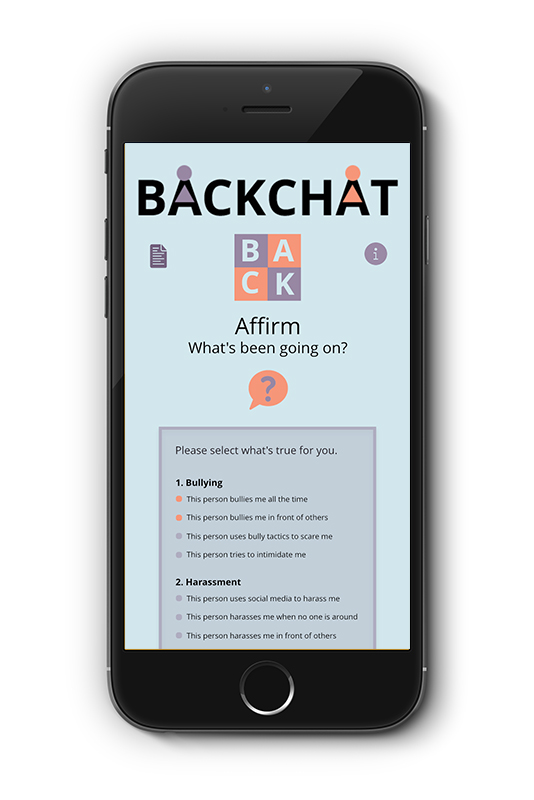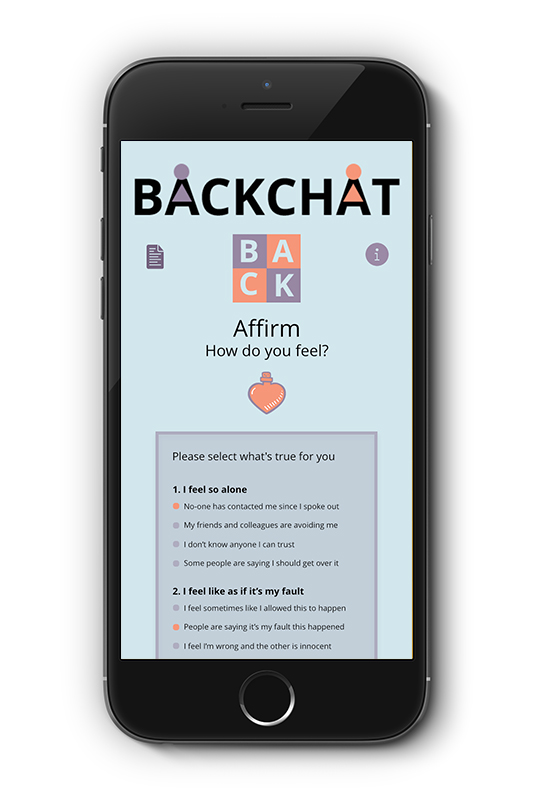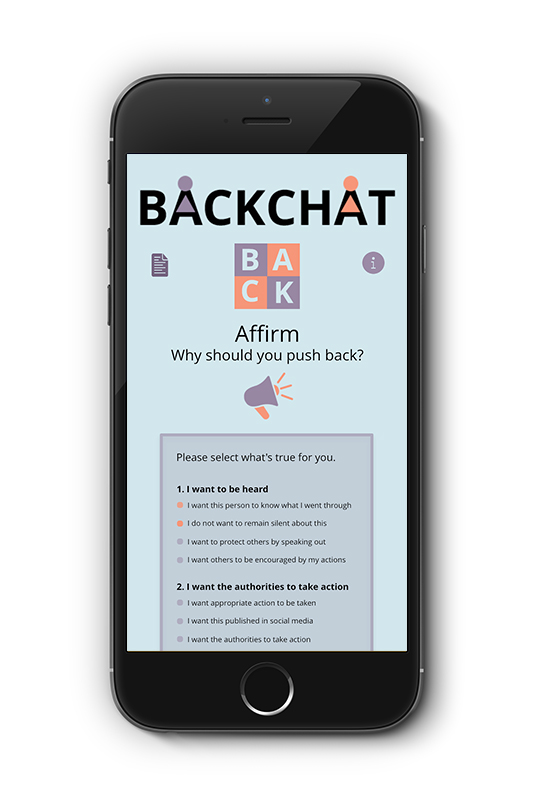The three questions
What’s been going on? | How do you feel? | Why should you push back?

What’s been going on?
To help participants identify the way they are experiencing bullying.
Participants identify their experiences from a list of 12 bullying scenarios with examples.
BackChat then replies with empathic responses to each situation.
Here is one scenario example and the empathic responses that appear on the next screen in the BackChat app:
Discrimination
(Please select experiences that are true for you)
This person tries to make me feel inferior
When someone tries to make you feel inferior, it is a sure sign they do not feel good about themselves. They are trying to project their feelings of inferiority on to you so that they feel better about themselves. It’s about their emotional and mental state, not yours.
This person thinks he/she is from a superior culture
When someone tries to impose their culture on you as being “superior,” it is a sure sign that they do not feel good about themselves and are trying to project their feelings of inferiority on to you so that they feel better about themselves. It’s about their cultural heritage and background, not yours.
This person discriminates against me
Being on the receiving end of discrimination is a degrading experience. It tells you something about their cultural heritage and background and their emotional and mental state. It has nothing to do with who you are. If you were not around, this person would find someone else to discriminate against.
This person gives preference to others because of who I am
This type of discrimination can be overt (clear messages in the way this person communicates) or covert (subtle and coded messages) about who you are and what you stand for. If this person operates covertly, it is a challenge to confront them and hold them accountable.

How do you feel?
To help participants clarify what they are feeling as a result of bullying.
Participants identify their feelings from a list of 24 scenarios. BackChat then replies with empathic responses to each emotion. Here is one scenario example and the empathic responses that appear on the next screen in the BackChat app:
I feel so alone
(Please select the experiences that are true for you)
No one has contacted me since I spoke out
It is disappointing and sad that no one has contacted you since you spoke out. It seems to be a common story amongst survivors of bullying that the support you were expecting is not forthcoming. Please do not give up. Search out support groups on social media. The support will come as you stay firm to your commitment to speak out.
My friends and colleagues are avoiding me
It is disappointing when you really need your friends and they don’t respond to you. Are you sure they are avoiding you? Could it be they are giving you space or are they just carrying on with their lives, unaware of what you are going through?
I don’t know anyone I can trust
Not knowing anyone you can trust is sad, lonely and disheartening. It can be an indication that your existing relationship network may be too insular and narrow. It is so important that you see this is an opportunity to actively seek out new relationships, both personal and professional. Finding an individual or group of people you can trust—using social media or in-person networking—should be your highest priority. They bring fresh perspectives, objectivity and often have sound advice.
Some people are saying I should get over it and move on
Saying you should just get over it and move on is an insensitive response to what you have gone through. Getting over it means denying yourself the time needed for inner work and healing as you try to make sense of what you have been through. People have tried to rush the process or suppress the emotional and psychological healing that needs to take place only to have it manifest years later because it is still unresolved.

Why should you push back?
To help participants understand why they should push back against bullying.
Participants clarify their reasons from a list of eight scenarios. BackChat then replies with empathic responses to each reason. Here is one scenario example and the empathic responses that appear on the next screen in the BackChat app:
I want to be heard. I want this person to know what I went through. I do not want to remain silent about this.
Make sure you have a trusted friend with you if you decide to speak out in person. It’s essential that your voice is heard and that you give yourself permission to speak out against bullying. As you mentioned, remaining silent is not an option.
I want to be left alone. I want this person to keep away from me.
Finding your voice is vital. The more you push back, the more your confidence grows as you communicate a clear, consistent message that this person must keep away.
I want this person to keep away. I do not want any relationship with this person.
Not having any relationship with this person is a vital first step in repairing your personal boundaries that have been violated.
I want to speak to a counsellor. I want professional support.
Seeking out professional support is a good thing. A professional counsellor or coach can add tremendous value by helping you re-create your sense of self and build your confidence. A psychologist, counsellor or coach can help you heal and provide guidance as you move forward in a safe, confidential environment.
I want to take back my power. I now know this person has no power over me. I know I’ve taken back my life.
It’s empowering to take back your life and to know this person has no power over you any more. It’s important to communicate your new message of empowerment to this person and all your friends, colleagues and family.
